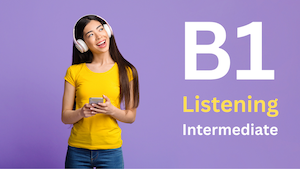Adjectives with -ed vs. -ing
Watch four videos using active and passive adjectives in conversation.
Conversation 1 | PDF Worksheet
Man: Have you seen the new Superman movie?
Woman: Yes, I have. It was so exciting! I loved the fight scenes. The special effects were amazing.
Man: Really? I didn’t like it. I thought it was slow, and the story was confusing.
Woman: I was a little confused, too, but I was entertained until the end.
Man: Not me. I was bored most of the movie. I also didn’t like villain. His voice was annoying. He talked funny.
Woman: Hmm, I didn't notice that. I thought for a villain he was pretty convincing.
Conversation 2 | PDF Worksheet
Man: How was the food at the new Italian restaurant?
Woman: The pasta was delicious, but the service was terrible.
Man: How so? Was the service slow?
Woman: Yes, and our waiter looked annoyed every time we asked for something.
Man: That’s too bad. It’s always disappointing to get bad service like that.
Woman: Yeah, I left feeling disatisfied, even though the food was good.
Conversation 3 | PDF Worksheet
Man: How was the hike yesterday?
Woman: It was exhausting, but the views were breathtaking. I've never seen anything so stunning.
Man: Wow! That’s cool! I heard the trail was challenging, and a bit frightening at spots, but worth the trek.
Woman: It was scary in places, and tiring, but it was rewarding in the end.
Man: Did you take any pictures?
Woman: No, but my friend did. I can show you them once he posts them.
Man: Oh, I’d like that. I’m excited to see them.
Conversation 4 | PDF Worksheet
Woman: Have you finished reading the novel for English class?
Man: Yes, it was so captivating. I couldn't put it down. I loved it.
Woman: Really? It was not my cup of tea. I was disappointed with the ending. I was surprised the book ended the way it did.
Man: Oh, really? I loved the ending. I found it really uplifting. I love a happy ending.
Woman: I do, too, normally, but I thought it was too cheesy. It just didn’t satisfy me.
Understanding -ing and -ed Adjectives
Some adjectives in English are made from verbs. These include adjectives that end in -ing and -ed. They look similar but have different meanings and uses. This lesson explains how they work and how to use them correctly.
Adjectives with "-ing" endings are agents of the action. The subject creates the feeling.
- The movie was exciting.
- The villain’s voice was annoying.
- The hike was exhausting.
- The views were breathtaking and stunning.
- The book was captivating and uplifting.
- The story was confusing.
- That trail was frightening and challenging.
Adjectives with "-ed" endings are recipient of the action. The subjects receives the actions or feels it. They do not create the feeling.
- I was confused during the movie.
- I was bored most of the time.
- Our waiter looked annoyed.
- I left feeling disappointed and dissatisfied.
- I was exhausted at the end of the hike.
- I was frightened on the trail.
- I was surprised by the ending.
- I felt satisfied with the result.
Many -ing and -ed adjectives come from verbs. Often, you can express the same situation in three different forms:
- The movie was boring.
- → Using an -ing adjective to describe the thing (the cause)
- The movie bored me.
- → Using the active verb directly
- I was bored by the movie.
- → Using an -ed adjective with passive structure (the effect)
Here are more examples of this pattern:
- The trail was frightening.
- The trail frightened me.
- I was frightened by the trail.
- The ending was disappointing.
- The ending disappointed us.
- We were disappointed by the ending.
- The lecture was interesting.
- The lecture interested them.
- They were interested in the lecture.
These forms are common when talking about movies, books, events, weather, or personal experiences.
- The hike was exhausting, but I was satisfied in the end.
- The story was confusing, and I was frustrated.
- The waiter was annoyed, and I felt uncomfortable.











